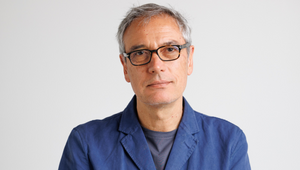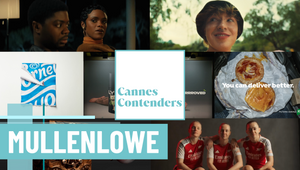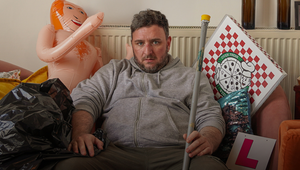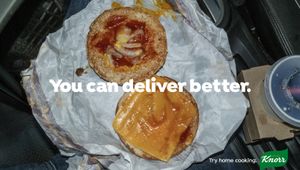
5 Minutes With… DLKW Lowe

LBB's editor Gabrielle Lott headed down to DKLW Lowe's famous South Kensington offices to meet the captains of the creative department, ECDs Richard Denney and David Henderson. Since DLKW and Lowe merged in 2010, Cannes success has followed and the agency has won some large Unilever clients. LBB finds out more from the men leading what’s rapidly becoming one of the hottest creative departments in London
LBB> Can you tell me more about the journey you’ve been on since joining the agency, what your challenge is and what’s your solution?
DH> It’s been just a little over a year. We joined September before last (2011) and at the time, we inherited an agency that was essentially a DKLW gig with their creative department.
LBB> Lowe, before that, was quiet. They disappeared off the radar a bit and from the outside eye, they seemed to have lost direction on who they were and what they were doing…
DH> They’d managed to retain all the Unilever business, but a lot of all their domestics had gone. Traditionally, in this kind of scenario, the big networks buy a well-performing agency. The trouble with DLKW was that it didn’t have a great creative reputation. It had a very good business reputation; it was very well managed, but creatively, it wasn’t as strong, which is why we were brought in. They positioned it pretty much as a start-up but with a big business. We were told to treat it as we wanted to. We were asked to establish some creative credentials and that’s what the first year has been about. We’ve been rebuilding the creative department and working with the existing clients to get them producing decent creative work. We’ve replaced eight creative teams with a mixture of experienced partnerships and hot new talent.
RD> We walked in and found out very quickly that there was really good planning and some really, really top account management, especially at senior level, which has made our life a lot easier. All we had to do was find the creative talent and, putting the two together, it can only lead to success. We were really sure on what we had to do and we’ve had nothing but support from them. That goes from joint CEOs Richard (Warren) and Tom (Knox) and the partners right up to Michael Wall. They’ve allowed us to create the shop windows (as we like to put it).
We wanted to prove that we can create really exciting work… something we’ve always prided ourselves on. That’s why we really enjoyed the challenge. It’s starting to pay off now and we’re getting credit from the industry, our colleagues and possible new clients.
LBB> What I’ve found really interesting is the return of Persil to Lowe + Partners globally. This is the first time that Lowe London has the account from BBH. What an achievement for you guys…
DH> Massive.
RD> They were on our radar right from the start. ‘Dirt is good’, as a strategy, originates from Lowe. People sometimes claim that it was JWT, but it’s a Lowe line that was written a long, long time ago in this building. It has been a personal ambition of Lowe’s to get that back.
DH> It was the first Unilever thing we looked at, because we knew it had a great end line and we thought it was a great place to start. Lowe + Partners had the brand around most of the world, but not in Europe. We thought it was a shame and we wanted to win the account. We created a little film just to show what we could do on it, what the UK was capable of, for Asia. They ran it in Singapore and all the clients got to see it.
DH> It’s been a lot of work - we’ve got a really big film coming out this year. We have the upmost respect for BBH, they’re doing really exciting stuff.
LBB> At Cannes you were the only Gold Lions for mobile in Europe, which you won for Microloan.
RD> We were the fifth most awarded agency in the UK, which is great. We got gold, three silvers and a bronze. We were just pipped by Wieden’s, but way ahead of people like DDB and AKQA, which we were really quite surprised by. If you just get your head down and work, you suddenly turn around and realise how far you’ve come. You have to keep that going, obviously, so we are all working really hard on it.
DH> You’ve met Jose Miguel Sokoloff so you know that the agency has a global ambition. We’ve always worked at big network agencies but this is probably the best one we’ve ever worked at. As a network, each agency is individual. Everyone has their own identity - which is brilliant. Jose Miguel Sokoloff sits at the chair of the creative council, because you need someone in that role, but everyone has an equal opinion. It’s not about personal ambition, it’s about working collaboratively as a network. Tony (Wright) and Michael (Wall) go to them and we’re all there as a mini jury to help improve each other’s work.
LBB> So there’s a real team feeling?
DH> There is. There genuinely is…
RD> At other agency networks that we’ve worked at it’s been quite combative, with people looking after their little dominions. I feel there’s a definite renewed sense of drive because we can see, clearly, the improvement that we can make. It’s amazing. In the last year there are about four or five offices that have really risen to the challenge and it’s suddenly got us back up the rankings. That’s great to see. It means you know that you’re not just doing it for the sake of it.
DH> People are talking about DLKW Lowe. What we wanted to do was put those two names together, create this new agency and everyone was positive about that.
LBB> How did you get into advertising and arrive at your current roles?
DH> When I grew up in the 80s, advertising was at his height. I was reading art and design at school. A friend of mine mentioned that you could actually do advertising as a career and that you could actually dream that stuff up. Boom… that was it for me. From the age of 15, that was what I wanted to do.
I studied a general design course at Sunderland so I could join the advertising course at Newcastle, which was one of the first in the country. I left after my first year, brought my portfolio down to London and got a job at DDB. The college kept calling me up to see if I was going to go back to complete my final dissertation – “yeah, right”. I was only 20, still a kid really, but I never looked back.
I was lucky that I started at a good agency because if you start at a dodgy one, you end up with all kinds of bad habits. I just feel fortunate that DDB gave me my first shot. They offered me a job. I knew very little about them, but I grabbed the opportunity.
RD> I originally started off at Y&R. Before that I did a degree in design and communication media at Kent Institute of Art and Design in Maidstone – there were no actual advertising courses available. I always had lots of ideas but could never really sit down and realise them. My tutor, whose brother-in-law worked below-the-line, said I’d be really good at advertising, which is something I had always liked. When I graduated, my partner quit his job below-the-line and we put together a book that got us into Y&R. I won Cannes Gold in my first year and it went from there. Y&R merged with Rainey Kelly, then I went on to Saatchi & Saatchi and then to DDB, under Jeremy Craigen. Our creative director at the time was Mike Cozens. We learned loads at all of the agencies we were at but personally I think DDB helped us get to where we are now.
DH> It was almost like a Swiss finishing school under Jeremy Craigen. You began to realise why the work they produced under him was so good.
RD> His approach was amazing, but he also had respect for the whole department. It was just a really great time and we learned bucket loads.
DH> It wasn't just about how you did ads, it was about your whole approach to the work.
RD> He has helped so many people in the industry across the world. He was such a good mentor. If you presented a script to him, he would find things that you wouldn't have even thought of. If he didn't like it, he would tell you why in a constructive way.
LBB> DLKW has a historical reputation for very direct, traditional advertising, whereas Lowe was famous for it’s creativity. What is DKLW Lowe?
RD> The first year was about a new creative department, centring on a creative offering from this agency. In effect, we were building a new shop window. To win new business you have to showcase your work. I think we have that work now. This year we are going to continue focusing on improving the agency’s output, but we’re also making some structural changes that are going to improve our digital offering.
DH> The most important thing for us is big, brilliant ideas. If you’ve got one of those, then it can be translated into any medium. We’re increasingly pushing our clients to take a 360 degrees package. Digital is really about focusing on the big idea. Things are starting to show. For example, for Halfords we created Tour de Francis. None of our work begins with us deciding that we need to produce a digital piece. Instead we look at what is right for the client’s needs.
RD> We’re quite lucky really because a lot of agencies had the ‘dreaded integration’ for digital, but there is nothing to integrate here. Most of our teams are made up of people that are 35 or under, so it’s not even an issue.
LBB> My favourite Christmas ad this year was the Morrisons campaign with the Mother going loopy in the kitchen. I loved its very traditional, British storytelling, which is something I’ve seen a lot in the work you’re producing. This idea of storytelling is being thrown around a lot at the moment…
DH> We didn’t want to just try to make ‘another John Lewis’, because you can spot them a mile off. The most important part was to be honest and that’s what we try and do with all of our projects. You can’t argue if the product stands up to what you are trying to say.
RD> What really changes things is the energy and approach you take. Once you’ve got a great script that people are buying into, you then apply really great production standards. We could have shot that Morrisons ad with other directors and it probably wouldn't have been as good. If you get really good, high-end directors, like Si & Ad, they just add that extra 10 per cent to a spot. Those certain extra layers that they bring to an ad make you go ‘ooh that was for Morrisons!’, as opposed to ‘oh it’s just one of those ads’. I think it was quite brave because everyone wants to be really happy at Christmas, but actually it can be a right pain in the arse. We all know it’s like that, but we all still really enjoy it.
DH> We made a few people cry too. But the spot is truthful because it is my wife, it is my mum, and people can relate to little parts of that. The other thing that was great about it is that it had a sense of humour. At the end of the day, we go through a lot of shit really, but it’s all worth it in the end.
LBB> You guys had a great year, with regards to collecting awards – how important are they to the agency?
RD> I think for an agency that is trying to re-establish its creative credentials, they’re very important. Internally they act as a focus to governors and departments.
DH> They also attract talent. The most awarded work is the stuff that’s different, brave, it challenges clients, protects ideas. So people will hopefully come here and see that kind of work and think ‘wow, this is where I can realise my great ideas’. With that, you get access to the top directors and photographers. All of those disciplines see that they can recognise their visions with those agencies.
RD> Everyone uses awards and tables. Unilever use the Gunn Report to see where you, as a company, stood last year.
DH> And with awards like the Spikes and Epica, it is a global playing field right now, which is really exciting. Only a few years ago, you might work on a piece that was set to be shown only in Asia and you’d fear none of your friends or the industry would see it. It’s completely different now; people are chomping at the bit to take the next brief that’s going to run in Singapore or China because those ideas travel. Look at SSP3 Lowe’s ideas for the guerillas – that’s international news now. That’s what we tell our teams. They know they can realise their ideas and everyone will see it.
LBB> Thinking of your Trainline spot, your clients seem to be letting you have a lot of fun and it seems like there’s a lot of trust…
RD> It can look like that, and we have managed to persuade them to trust us, that brave work will create better results. The Trainline campaign is a perfect example because they were quite worried about coming away from the previous campaign. It had had good results, but it was probably quite an irritating ad for a lot of people. When we told them that we weren’t going to take the same approach anymore, there was a lot of to-ing and fro-ing, but we managed to persuade them.
DH> The thing is with this idea, as bonkers as it is, you can’t argue with it. When you sit on the train and see how much cheaper someone else’s ticket is, there’s nothing worse! It’s the same with holidays. It’s based on the truth and I’ll buy that - so let’s dramatize it and have a bit of fun.
RD> When the ad came out, their figures went through the roof and broke all of their records. But 90 per cent of our work is not making ads, it’s persuading clients, once we’ve got that work, to run it and protect it.
LBB> What does 2013 hold for you guys and the agency?
RD> We’ve got a great film coming out, which is directed by Tom Tagholm, who shot Channel 4’s ‘Meet The Superhumans’, for the charity Marie Curie. A lot of people don't actually know what Marie Curie is and what they do, so we’re doing a brand film for them.
DH> And to go with that film, there’s lots of activation stuff coming out too.
RD> There’s also some work for Organix, who are one of our smaller clients. They’re a really cool baby food company. We’ve persuaded them to do brand ads, rather than loads of product ads, again just to state what their mission is. We’ve got a lovely script for that.
There are loads of other projects in the pipeline. TRESemmé shampoo want some interesting work doing because they’ve seen what we did for Persil. Since Persil, a lot of the Unilever clients are popping up and asking us to look at their brand. Half of them are kind of muddling along and their visuals are ok, but they want really good stuff now. We’ve got an exciting year ahead.















